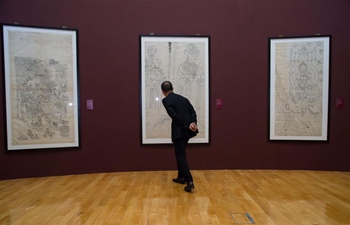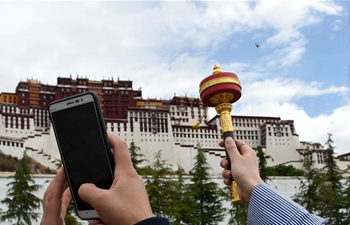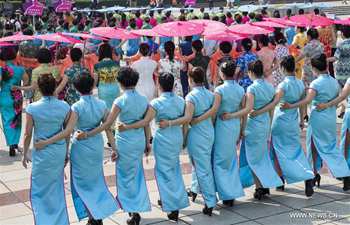TOKYO, May 23 (Xinhua) -- Japan's lower house of parliament on Tuesday passed a controversial bill to criminalize the plotting of terror attacks or serious crimes following the ruling coalition forcing the bill through by way of majority vote.
The contentious "conspiracy bill," staunchly disapproved of by the opposition camp, has now been sent to the upper house of parliament for further deliberation, with Prime Minister Shinzo Abe's ruling Liberal Democratic Party-led bloc now looking to drive its passage through the upper chamber during the ongoing Diet session through June 18.
Opposition parties, legal scholars and civil rights groups, however, are adamant that the bill could be arbitrarily applied to ordinary citizens and allow law enforcement authorities undue rights to infringe on civil liberties by way of unrestrained surveillance.
Last Friday, the bill was driven through a lower house committee amid scenes of mayhem as opposition parties vociferously called for the bill to be scrapped due to the potential for its use to infringe on civil rights.
As has been the case in recent weeks, protesters with banners, placards and leaflets lobbied around parliament in Tokyo on Tuesday seeking for the bill to be scrapped.
Protesters were quoted as saying the government is using upcoming major international events to be held in Japan as excuses to force the bill's passage.
The government's push for the latest version of the bill to become law is also, purportedly, to ratify the UN Convention against Transnational Organized Crime, which Japan signed in 2000.
The opposition camp insists, however, that due to the lack of sufficient deliberation in parliament the bill does not have public support.
In the latest iteration of the bill, which is aimed at amending the law on organized crime, the charge of conspiracy has simply been reworded as "preparations for terrorism or similar acts."
Versions that have since been scrapped applied to "broader" groups, but the current one specifies the legislation applies to "organized criminal groups."
The proposed charge would apply to groups of two or more people found to have planned one of 277 listed crimes, with at least one of them having made advanced preparations such as scoping out a potential location.
All four major opposition parties remain united in killing the bill and have vowed not to allow it to pass through parliament and into law, stating that the current bill is no different to former iterations submitted to parliament that have been scrapped.
They claim that the bill will erode the integrity of the criminal code in Japan by allowing people to be charged in connections with crimes that have not been committed.
The Japan Federation of Bar Associations stated previously that the bill is ambiguous in its scope and its vagueness regarding the definition of terrorist organizations and criminal groups could lead to the undue punishment of innocent civilians and groups.

















